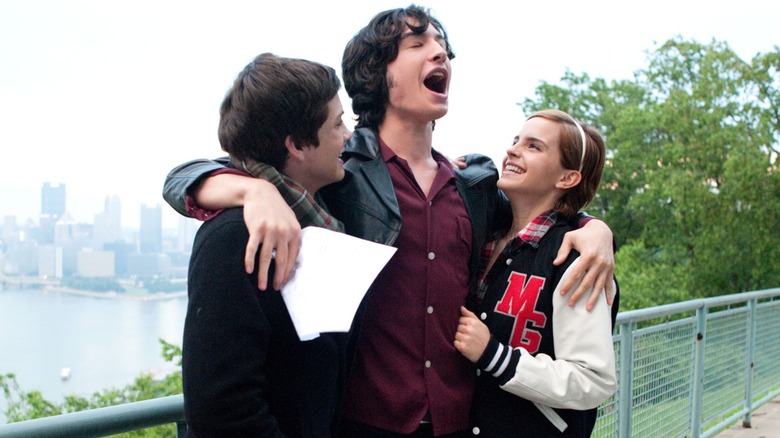A Beloved Emma Watson Drama Is Based On A Book Banned In Schools
Coming-of-age literature can be integral to the teenage experience. These stories about growing pains often serve as a mirror, fostering a better understanding of intense, unprocessed emotions. Books aimed at young adults can also appeal to a much wider demographic, as the language of pain is universal, and comfort can be found in different corners of art.
Stephen Chbosky's "The Perks of Being a Wallflower" is one such book, as it tells a coming-of-age tale partially drawn from the author's memories. It's a difficult book to get through solely because of how intensely Chbosky captures the agony and bliss associated with growing up (where feelings of belonging are interspersed with bouts of acute loneliness). Needless to say, the novel deals with some heavy themes, including drug abuse, sexual assault, and mental health crises, which Chbosky uses to explore what it means to be young and troubled.
Unfortunately, the presence of these themes has turned "The Perks of Being a Wallflower" into a target for rampant book banning, with Chbosky's 1999 novel having been either restricted or completely removed from many American school libraries. This kind of censorship sets a dangerous precedent for what's accessible to a younger demographic (and what's not), creating a slippery slope that might lead to ideological myopia. Even revered, best-selling authors like Stephen King aren't exempt from such censorship, as his mildly political, totally non-explicit book "The Dead Zone" has also been banned by numerous schools solely because it's a horror story.
When asked about the repeated book ban, Chbosky once told the National Coalition Against Censorship that he was deeply saddened by it, as it robbed children of an experience that could have made them feel a little less alone:
"It's been so many times [the book bans] that I've honestly lost count. I know it's made the American Library Association's top 10 list five times, so it's happened a lot [...] I was sad because you publish a book, in part, to end the silence about certain issues. But then certain people object, and they try to censor your book, and all of that is just silence. I know what the book has meant to certain kids because I've been getting letters from them for well over a decade. So, every time this happens, I just think about that one kid in the community who could really use the book."
Let's dive deeper into the reasons why Chbosky's novel is considered inappropriate for school libraries, and how the contents of the book (as well as its film adaptation, which stars a certain "Harry Potter" veteran) actually hold up against these concerns.
The Perks of Being a Wallflower has always been at the center of (trite) controversy
In 2012, Chbosky (who also helmed "Dear Evan Hansen") directed a movie version of "The Perks of Being a Wallflower," which does a competent job of conveying the bittersweet complexities of the original novel. In the film, Charlie (Logan Lerman) unwittingly deals with debilitating post-traumatic stress while navigating high school, finding comfort in his relationships with his fellow students Patrick (Ezra) and Sam (Emma Watson). But while Sam and Patrick do their best to be an emotional anchor for Charlie, they are mired in their own problems rooted in identity, loss, and dwindling self-esteem.
Chbosky's film is unflinching in its approach to exploring these uncomfortable emotions, creating a journey so hard-hitting and poignant that it achieved cult classic status shortly after its release. On the critical and commercial front, the movie did pretty well (grossing $33.3 million against a $13 million budget) and was praised for its committed central performances, along with its ability to address heavy topics with incredible nuance.
Alas, such nuance has been lost on the folks who've eagerly sought to get Chbosky's book banned since it was published. According to the Marshall University Library, "The Perks of Being a Wallflower" has been banned in American schools for reasons ranging from its "profanity and descriptions of drug abuse, sexually explicit conduct, and torture" to its mentions of homosexuality and "offensive content" in relation to Patrick. Even in cases where the book wasn't completely banned, its presence in school libraries was often challenged (and, in some cases, retained) from 2003 to 2023.
While these concerns are egregious enough, some schools banned "The Perks of Being a Wallflower" solely on the grounds of it being "disgusting," which is clearly a knee-jerk reaction to the complex themes Chbosky explores in the novel. Moreover, it should be made clear that none of these topics are handled in a way that's sensational or gratuitous; they're simply part of the story and its characters' tumultuous journeys, which are treated with a deliberately dispassionate sense of empathy. Censoring such a poignant literary experience severely limits a child's understanding of adolescent discomfort, along with the sweet high of friendships that start to feel a lot like home.

